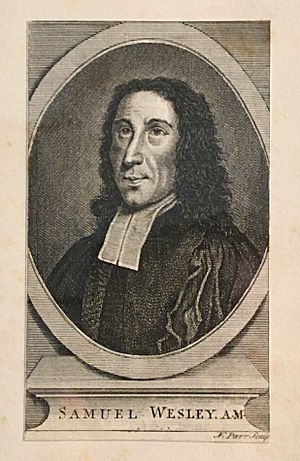Samuel Wesley (poet, died 1739) facts for kids
Quick facts for kids
Samuel Wesley
|
|
|---|---|

Portrait of by Nathaniel Parr (Poems on Several Occasions, 1743)
|
|
| Born | February 10, 1691 Spitalfields, London
|
| Died | November 6, 1739 (aged 48) |
| Other names | Samuel Wesley the Younger; Samuel Wesley Junior |
| Occupation | Anglican priest |
| Known for | Christian poetry |
Samuel Wesley the Younger (born around 1690 or 1691, died 1739) was an English poet, teacher, and a priest in the Church of England. He was the oldest of the famous Wesley brothers. His younger brothers were John Wesley and Charles Wesley. Even though his brothers started the Methodist movement, Samuel himself was not a big part of it.
Early Life and Family
Samuel Wesley was born in Spitalfields, London. His father was also named Samuel Wesley, and he was a poet and a priest. His mother was Susanna Annesley Wesley. Samuel was the oldest of their many children. There is some confusion about his exact birth year, but it was either 1690 or 1691.
Education and Career
Samuel went to a famous school called Westminster School. After that, he studied at Christ Church, Oxford University. He earned his first degree in 1715 and a master's degree in 1718.
After finishing his studies, Samuel became a teacher. He worked at Westminster School for 20 years, from 1713 to 1733. He was the head teacher there. Later, he became the headmaster of Blundell's School in Tiverton, Devon. He died in Tiverton in 1739 after a short illness and is buried there.
His Family Life
Samuel Wesley married Ursula Berry. She was the daughter of a priest named John Berry. Samuel and Ursula had six children together. Sadly, four of their children died when they were very young. Only two of their children, a daughter and a son, lived to be adults.
His Beliefs and Writings
Samuel Wesley was a strong supporter of the traditional Church of England. He was friends with a bishop named Francis Atterbury. Even though his younger brothers founded Methodism, Samuel never joined their movement.
However, Samuel was a talented poet. He wrote many Christian poems and hymns. Five of his hymns are still used today in the Wesleyan Hymn Book, which is a collection of hymns used by Methodists.
Here are some of the works Samuel Wesley wrote:
- 1723 The Battle of the Sexes. A Poem.
- 1726 Pastoral.
- 1726 The Iliad in a Nutshell: or, Homer's Battle of the Frogs and Mice.
- 1736 The Descriptive: a Miltonick. After the Manner of the Moderns.
- Around 1736 Wroote: a Heroic Poem. (This poem was dedicated to his sister, Mehetabel Wesley.)
 | Bayard Rustin |
 | Jeannette Carter |
 | Jeremiah A. Brown |

